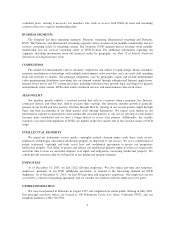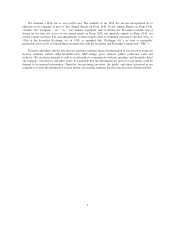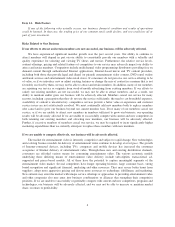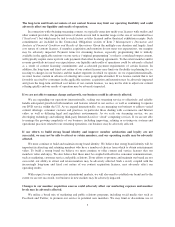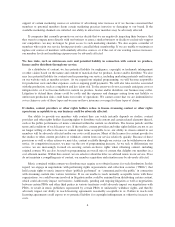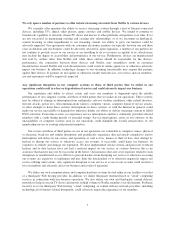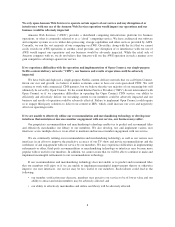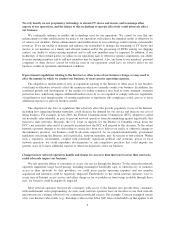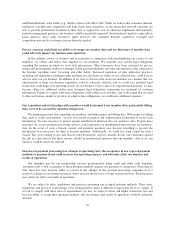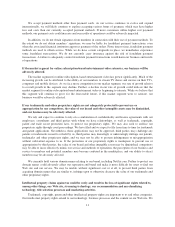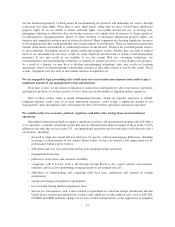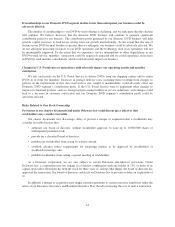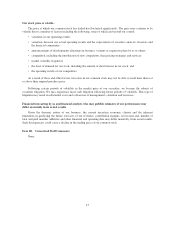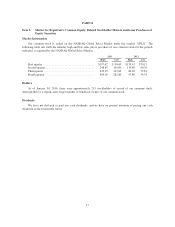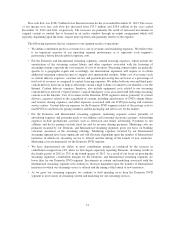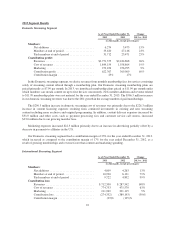NetFlix 2013 Annual Report Download - page 14
Download and view the complete annual report
Please find page 14 of the 2013 NetFlix annual report below. You can navigate through the pages in the report by either clicking on the pages listed below, or by using the keyword search tool below to find specific information within the annual report.use the intellectual property of third parties in merchandising our products and marketing our service through
contractual and other rights. From time to time, third parties allege that we have violated their intellectual
property rights. If we are unable to obtain sufficient rights, successfully defend our use, or develop non-
infringing technology or otherwise alter our business practices on a timely basis in response to claims against us
for infringement, misappropriation, misuse or other violation of third-party intellectual property rights, our
business and competitive position may be adversely affected. Many companies are devoting significant resources
to developing patents that could potentially affect many aspects of our business. There are numerous patents that
broadly claim means and methods of conducting business on the Internet. We have not searched patents relative
to our technology. Defending ourselves against intellectual property claims, whether they are with or without
merit or are determined in our favor, results in costly litigation and diversion of technical and management
personnel. It also may result in our inability to use our current Web site, streaming technology, our
recommendation and merchandising technology or inability to market our service or merchandise our products.
As a result of a dispute, we may have to develop non-infringing technology, enter into royalty or licensing
agreements, adjust our merchandising or marketing activities or take other actions to resolve the claims. These
actions, if required, may be costly or unavailable on terms acceptable to us.
We are engaged in legal proceedings that could cause us to incur unforeseen expenses and could occupy a
significant amount of our management’s time and attention.
From time to time, we are subject to litigation or claims that could negatively affect our business operations
and financial position. As we have grown, we have seen a rise in the number of litigation matters against us.
Most of these matters relate to patent infringement lawsuits, which are typically expensive to defend.
Litigation disputes could cause us to incur unforeseen expenses, could occupy a significant amount of our
management’s time and attention and could negatively affect our business operations and financial position.
We could be subject to economic, political, regulatory and other risks arising from our international
operations.
Operating in international markets requires significant resources and management attention and will subject
us to regulatory, economic and political risks that may be different from and incremental to those in the U.S. In
addition to the risks that we face in the U.S., our international operations involve risks that could adversely affect
our business, including:
• the need to adapt our content and user interfaces for specific cultural and language differences, including
licensing a certain portion of our content library before we have developed a full appreciation for its
performance within a given territory;
• difficulties and costs associated with staffing and managing foreign operations;
• management distraction;
• political or social unrest and economic instability;
• compliance with U.S. laws such as the Foreign Corrupt Practices Act, export controls and economic
sanctions, and local laws prohibiting corrupt payments to government officials;
• difficulties in understanding and complying with local laws, regulations and customs in foreign
jurisdictions;
• unexpected changes in regulatory requirements;
• less favorable foreign intellectual property laws;
• adverse tax consequences such as those related to repatriation of cash from foreign jurisdictions into the
United States, non-income related taxes such as value-added tax or other indirect taxes, such as ISS, PIS,
COFINS and CIDE in Brazil, changes in tax laws or their interpretations, or the application of judgment
12


